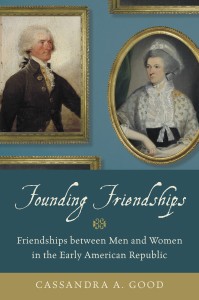Cassandra Good, associate editor of the Papers of James Monroe, was interviewed for With Good Reason and the New Books Network podcast. She spoke about her book, “Founding Friendships: Friendships Between Men and Women in the Early American Republic” (Oxford, 2015).
James Monroe Editor Speaks at Monticello
Cassandra Good, associate editor of the Papers of James Monroe, spoke at the International Center for Jefferson Studies at Monticello. She presented on her book, Founding Friendships.
Cassandra Good Appears on History TV Show
Cassandra Good, Associate Editor of the Papers of James Monroe, will appear on a Travel Channel special titled, “Mysteries at the White House” on Friday, Nov. 7 at 9 p.m. She was interviewed for a segment about Andrew Jackson’s 1829 inaugural ball.
Daniel Preston Publishes Chapter in Book
 Daniel Preston, editor of the Papers of James Monroe, had an essay entitled “James Monroe, 1758-1783: Student and Soldier of the American Revolution” published as a chapter in “A Companion to James Madison and James Monroe,” edited by Stuart Leibiger by Wiley-Blackwell in their “The American Presidents” series.
Daniel Preston, editor of the Papers of James Monroe, had an essay entitled “James Monroe, 1758-1783: Student and Soldier of the American Revolution” published as a chapter in “A Companion to James Madison and James Monroe,” edited by Stuart Leibiger by Wiley-Blackwell in their “The American Presidents” series.
Daniel Preston Presents at Conference in London
 Daniel Preston, editor of the Papers of James Monroe, presented a paper entitled “Sectional Reconciliation in the Aftermath of the War of 1812: James Monroe in New England, 1817” at the conference “The War of 1812: Myth and Memory, History and Historiography,” held at the University of London July 12 to 14. Preston also attended conferences this summer in Edinburgh, Scotland and Baltimore, Md.
Daniel Preston, editor of the Papers of James Monroe, presented a paper entitled “Sectional Reconciliation in the Aftermath of the War of 1812: James Monroe in New England, 1817” at the conference “The War of 1812: Myth and Memory, History and Historiography,” held at the University of London July 12 to 14. Preston also attended conferences this summer in Edinburgh, Scotland and Baltimore, Md.



